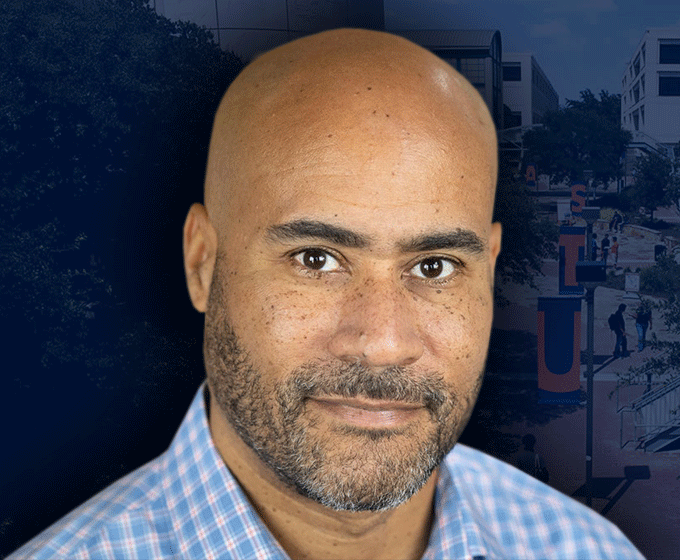
OCTOBER 27, 2021 — The University of Texas at San Antonio will present a new course this spring that will explore racial identity and histories and look at the African Diaspora through a transnational lens.
“Global Blackness and Afro-Latinidad” — a cross-listed course in African American and Mexican American Studies in the Department of Race, Ethnicity, Gender and Sexuality Studies — is spearheaded by Marc Perry, an associate professor in the UTSA College of Education and Human Development.
The course will explore the lived experiences of African-descended peoples from Latin America and the Caribbean, many of whom reside in the U.S.
“I bring a transnational perspective to my work and the teaching I do. And I try to encourage students to think expansively beyond national boundaries that tend to want to confine us,” Perry said. “Many students at UTSA have families and share histories of transnational migration. They are part of these movements, histories and ideas that cross borders.”
Many individuals of Latino backgrounds aren’t aware of communities of Afro-Latinos who live throughout places like Mexico, Brazil and Columbia, Perry added.
“A lot of times these histories have been erased or made invisible,” Perry said. “What my course is trying to do is help us explore some of those connections and break down some of the artificial divides between Blackness and Brownness that many of us and our communities tend to live.”
During the new course, students can expect to discuss the history of mestizaje (racial mixing), a central paradigm throughout Latin America.
“It’s important to understand some of this history. We’re going to be focusing on experiences of racism within different countries throughout the Americas and their impact on African-descent people,” Perry said. “We will also spend time exploring music, culture, religion and how African-descended communities create spaces of culture and community that relate to their African roots as well as their contemporary Latin American circumstances.”
A big focus of the course will be on connecting the dots between different spaces, Perry said. “We’re going to be in the Caribbean, South America, Mexico, Central America and here in the United States,” he said. “It’s important to know that these histories are tied to communities here in the United States.” The class will also look at how younger individuals navigate their experiences in their contemporary settings, Perry added.
Families with connections to these histories who immigrated to the U.S. have helped shift how we think about race and Afro-Latinidad and global Blackness within local settings, Perry added.
For the students who experience the course, Perry hopes they can begin to think more critically about Black and Brown divides that many tend to experience.
“My encouragement is to really challenge and break down some of these artificial divides that separate us,” he said, “and to understand that in fact both historically and contemporarily we have a lot to share and a lot of overlaps. At the end of the day, we’re all trying to get to the same place. As I tell my students, we’re all trying to get free of systems that want to deny our full freeness and ultimately our full humanity as people.”
UTSA Today is produced by University Communications and Marketing, the official news source of The University of Texas at San Antonio. Send your feedback to news@utsa.edu. Keep up-to-date on UTSA news by visiting UTSA Today. Connect with UTSA online at Facebook, Twitter, Youtube and Instagram.
Move In To COLFA is strongly recommended for new students in COLFA. It gives you the chance to learn about the Student Success Center, campus resources and meet new friends!
Academic Classroom: Lecture Hall (MH 2.01.10,) McKinney Humanities BldgWe invite you to join us for Birds Up! Downtown, an exciting welcome back event designed to connect students with the different departments at the Downtown Campus. Students will have the opportunity to learn about some of the departments on campus, gain access to different resources, and collect some giveaways!
Bill Miller PlazaJoin us for an intimate evening of cocktails, conversation, and culinary inspiration with Pati Jinich, Emmy-nominated chef and James Beard Award-winning author. Enjoy light bites and signature drinks in the warm, modern setting of Mezquite as Pati connects with guests over her passion for Mexican cuisine and storytelling.
Mezquite Restaurant in Pullman Market, 221 Newell Ave., San Antonio 78215From inspired courses to thoughtful pairings and a rich sense of community, the Ven a Comer Signature Dinner is a night of shared meals, shared stories, and unforgettable flavor.
Stable Hall (Pear Brewery), 307 Pearl Pkwy, San Antonio 78215Come and celebrate this year's homecoming at the Downtown Campus with food, games, giveaways, music, and more. We look forward to seeing your Roadrunner Spirit!
Bill Miller PlazaThe University of Texas at San Antonio is dedicated to the advancement of knowledge through research and discovery, teaching and learning, community engagement and public service. As an institution of access and excellence, UTSA embraces multicultural traditions and serves as a center for intellectual and creative resources as well as a catalyst for socioeconomic development and the commercialization of intellectual property - for Texas, the nation and the world.
To be a premier public research university, providing access to educational excellence and preparing citizen leaders for the global environment.
We encourage an environment of dialogue and discovery, where integrity, excellence, respect, collaboration and innovation are fostered.